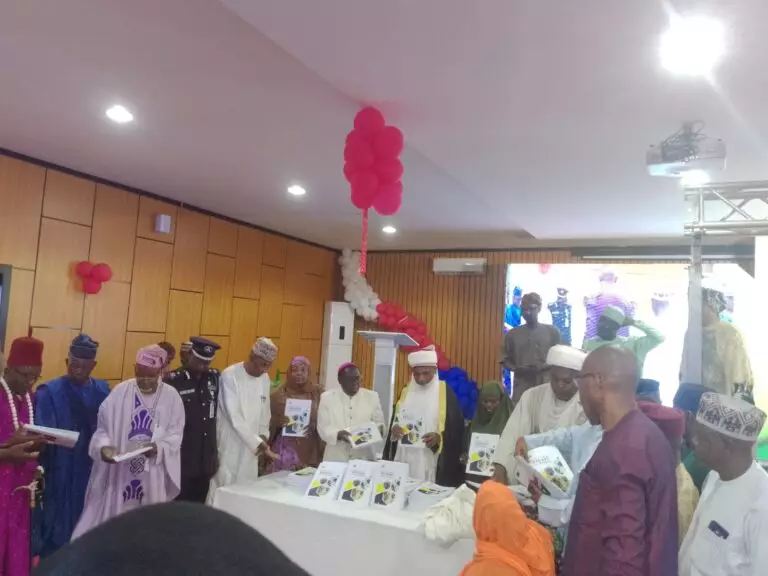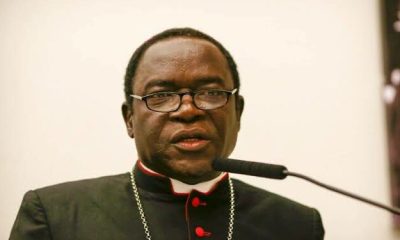Headline
Sultan, Kukah seek community involvement in tackling security challenges

The Sultan of Sokoto, Alhaji Sa’ad Abubakar III, has called for increased community representatives’ involvement in solving the lingering security challenges facing the nation.
Abubakar, who was represented by Dr Jabbi Kilgore, the District Head of Kingori made the call during a town hall organised by the Kukah Centre for Peace in collaboration with Global Right, an NGO on Tuesday in Sokoto.
The Sultan said that bad governance, injustice and inequality were some factors contributing to insecurity.
He enjoined leaders at all levels to be fair in dealing with their subjects and know that they would give an account of their stewardship after leaving this world.
In his keynote address, Bishop of Sokoto Diocese, Bishop Mathew Kukah also identified religious intolerance, fanaticism and injustice as some of the factors responsible for insecurity in the country.
Kukah also said that sectionalism, fanaticism, injustice and religious intolerance were responsible for insecurity in the country.
He urged stakeholders at the meeting to come together to form common front in curbing the menace saying insecurity know no religion.
Exif_JPEG_420
Earlier, Gov. Ahmad Aliyu of Sokoto state, represented by the Permanent Secretary Ministry for Religious Affairs, Alhaji Abubakar Torankawa rreiterated the commitment of the government to partner with groups and association in promoting peaceful coexistence in the state.
The Sokoto state commissioner of police, Ali Kaigama, also emphasised on the need for public support to community policing drives initiated by the Nigerian Police.
Kaigama said the police will continue to partner with the Nigerian army and other sister security agencies in tackling insecurity in the country.
In his presentation, Prof. Tukur Baba, the Dean Faculty of Social Sciences in Federal University Birnin Kebbi dwelled on factors that promoted insecurity from pre-independece.
Baba advised authorities to change the land use act, taxations and consider global, regional, national and community approaches to holistically deal with the problems of insecurity.
He described the assessment by the National Bureau of Statics revealing the poverty index as glaring.
”This is the effect of insecurity, maladministration and poor people attitude in the northwest,” he said.
Also, the Executive Secretary of Zaki’s GEM Foundation and Permanent Secretary Sokoto state Ministry of Women and Children Affairs, Dr Nafisa Zaki and Hajia A’isha Dantsoho, called authorities to promote gender equitable norms, inclusiveness and budgeting in all dealings.
The leader of community dialogue committee and District Head of Gagi, Alhaji Sani Umar-Jabbi, presented a graphic community involvement drives to solve religious misconceptions, gender-based violence and other associated society ills.
Umar-Jabbi solicited for more support in recognition of committee achievements in Sokoto state stressing that violence is rooted in poverty and ignorance while it’s effect affects everyone irrespective of religious beliefs, ethnicity and political groups.
Headline
Fagbemi warns against obstructing EFCC from performing its lawful duty

The Minister of Justice, Lateef Fagbemi, SAN has warned against obstructing the Economic and Financial Crimes Commission (EFCC) from carrying out its lawful duty .
Fagbemi’s warning is contained in a statement in Abuja.
“This is a matter of very grave concern, it is now beyond doubt that the EFCC is given power by the law to invite any person of interest to interact with them in the course of their investigations into any matter, regardless of status.
“Therefore, the least that we can all do when invited, is not to put any obstruction in the way of EFCC, but to honourably answer their invitation.
“A situation where public officials who are themselves subject of protection by law enforcement agents will set up a stratagem of obstruction to the civil and commendable efforts of the EFCC to perform its duty is to say the least, insufferably disquieting’’.
He added that running away from the law will not resolve issues at stake but only exacerbate them.
“Nigeria has a vibrant judicial system that is capable of protecting everyone who follows the rule of law in seeking protection.
“I therefore encourage anyone who has been invited by the EFCC or any other agency to immediately toe the path of decency and civility by honouring such invitation instead of embarking on a temporising self-help and escapism.
“This can only put our country in bad light before the rest of the world’’.
He said institutions of state should be allowed to function effectively and efficiently.
“I stand for the rule of law and will promptly call EFCC, and indeed any other agency to order when there is an indication of any transgressions of the fundamental rights of any Nigerian by any of the agencies’’.
NAN reports that the EFCC had on Wednesday warned members of the public that it was a criminal offence to obstruct officers of the Commission from carrying out their lawful duties.
Section 38(2)(a(b) of the EFCC Establishment Act makes it an offence to prevent officers of the Commission from carrying out their lawful duties. Culprits risk a jail term of not less than five years.
The warning , the EFCC said, became necessary against the background of the increasing tendency by persons and groups under investigation by the Commission to take the laws into their hands by recruiting thugs to obstruct lawful operations of the EFCC.
On several occasions, the anti graft agency said, operatives of the Commission have had to exercise utmost restraint in the face of such provocation to avoid a breakdown of law and order.
Headline
Unknown Gunmen Abduct Channelstv Reporter In Port-harcourt

Some unknown gunmen have kidnapped Joshua Rogers, the ChannelsTV reporter in Port-Harcourt, the Rivers State capital.
Politics Nigeria learnt that Rogers was picked up close to his residence at Rumuosi in Port Harcourt and to an unknown destination by the gunmen around 9pm on Thursday, April 11.
The reporter was driving his official ChannelsTV branded car when the hoodlums accosted, pointed a gun at him and took him away in the same vehicle.
Rogers was said to be returning from his official assignment in Government House after a trip to Andoni for a government event when the incident happened.
Already, the gunmen were said to have contacted his wife and demanded a N30million ransom for bis release.
His cameraman confirmed the incident and appealed to his abductors to set him free unconditionally.














